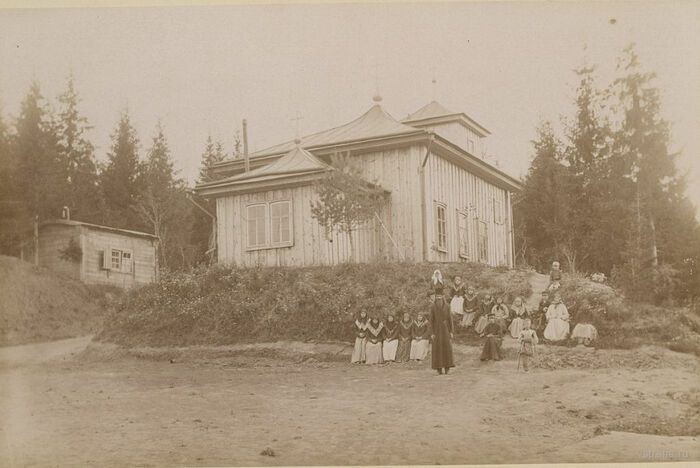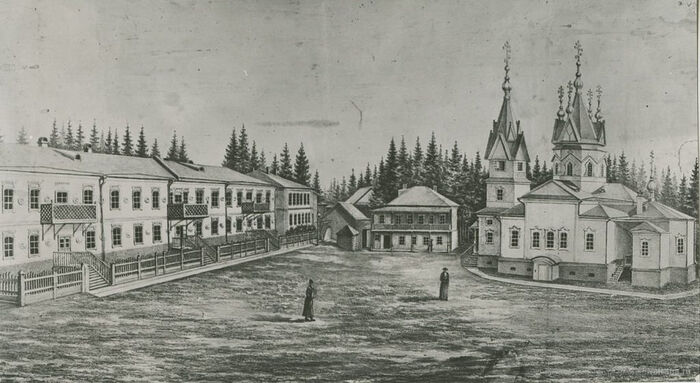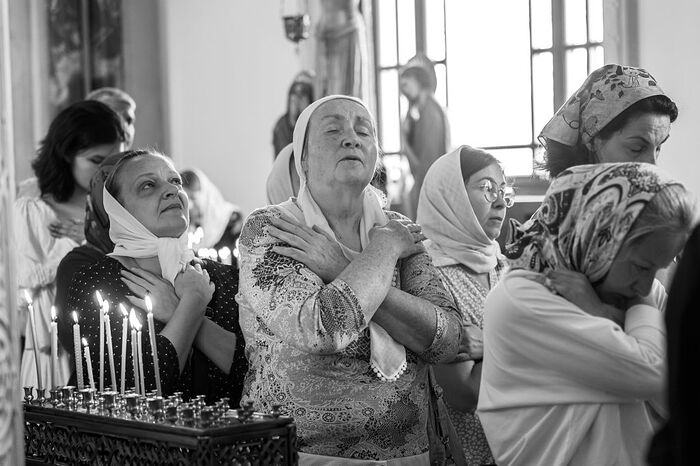For whosoever shall call upon the name of the Lord shall be saved (Rom. 10:13).
The purpose of the Christian life on earth is to strive for union with God, so that man, gradually developing the spiritual abilities placed in him by the Creator, could in the end unite with Him in eternity and enjoy communion with Him. Those who desire to achieve the salvation of the soul must not only fight with sin, but also strive to acquire the virtues. According to the teaching of the Vyatka ascetic and spiritual writer St. Stephan of Fileika, the most important aspect of spiritual work, and a means of acquiring the virtues, is prayer.
It’s impossible to imagine the spiritual life of a man without the asceticism of prayer, because “without prayer, not only does any virtue weaken, but the spiritual life of the perfect itself ceases in a man.” “To labor with a good feat of faith and complete the course of our earthly life without stumbling, we must pray vigilantly.”
Prayer, according to the teaching of the saint, is firstly a necessary and irreplaceable means “of freeing us from darkness and entering into the wonderful light of God, or, in other words, coming out from under the power of satan (cf. Acts 26:18) and settling into the Kingdom of God.” Secondly, it is necessary for the preservation of the grace given by God. “The flame kindled by prayer doesn’t allow any sinful thought to reach the heart,” Fr. Stephan teaches. And thirdly, prayer is the core and breath of the spiritual life, without which a man dies in spirit: “As the life of a fish ends without water, so without prayer, the soul of man, separated from the Spirit of God, freezes or falls into a mortal sleep.” “Here is a sign of a soul that has died for God: numbness of heart, the cessation of inner prayer.” Many spiritual ailments, according to Fr. Stephan, are directly connected with the absence of prayerful activity in the life of man: “This is why a man loses heart—because he stops praying.”
The saint defines prayer as “the petition of the mind and heart to God, the union of the soul with God; and by its action—the revitalization and breath of the immortal Spirit.” At the same time, the essence of prayer should manifest itself in the appeal of the mind and heart of man to God, without which “external prayer is like a soulless, stillborn fruit of the womb.” In the understanding of St. Stephan, prayer itself is a gift of God: “Man learns prayer only by God, Who gives prayer to the one who prays.” From man is required the participation of his heart: “He who truly prays is he who prays with his spirit, without which even the most eloquent petitions are in vain. Therefore, don’t consider it success in prayer when you read many prayers, but when every word comes from your heart.”
How to pray
Speaking about prayer, St. Stephan doesn’t emphasize the prayer rule itself, but speaks about prayerful work as such. It should be noted that St. Stephan celebrated the full cycle of daily services and read akathists every day. He gave special preference to the akathist to the Holy Protection of the Most Holy Theotokos and advised others to read akathists every day.
Neither the place nor the position of the body play an essential role in the success of the work of prayer. “If you have a broken heart, then people won’t hinder you, and location won’t impede you from offering your sacrifice to God at any time. You can sit on the ground and look up to Heaven and sigh about your sins—even lying down is no worse than standing in church—and beseech mercy from God, for God doesn’t disdain any position from a man of prayer if he has a spiritual disposition towards Him and a repentant heart.”
At the same time, the saint sharply indicates the need to go to church services: “We know that there is divine ministry in the house of God; because if someone doesn’t go to the house of God, it means he doesn’t want to serve God; whoever doesn’t want to be a servant of God, he involuntarily becomes a slave of the enemy of God—the devil, and shall forfeit the inheritance of the slaves of God—the Kingdom of Heaven, and go into the torment prepared for the devil and his accomplices.” It should be noted that a separate work of Fr. Stephan, Talks on Serving God on Feast Days, is completely dedicated to fulfilling the fourth commandment of the Law of God.
For successful prayer, we need humility and the fear of God. “The Lord, as it’s said, will perform the desire of them that fear him: and He will hear their supplication (Ps. 144:19); therefore, when you begin to pray, think about who you are and Who it is you’re daring to speak with.”
According to the saint, a necessary condition for proper prayer is renouncing your own will and completely trusting in God in the matter of receiving what you beseech: “So, for example, a man desires to do some good, which he’s unable to do, or which is incongruent with his way of life, or it’s premature, when he has neither knowledge nor humility; then the evil spirit kindles a desire and compels him to do good, from which there is confusion of soul, despondency, and even despair. That’s why we should pray not according to our own desire, but as is pleasing to God; for He alone knows how the soul of every man can be saved.”
It would be irrational to pray from an impure heart, from an unbroken spirit, asking for vain and earthly things at the expense of the spiritual. “But perhaps the greatest of these evils,” concludes Fr. Stephan, “is to pray with malice against our neighbor. If a man brings hatred for another to the house of God instead of the God-pleasing sacrifice of a contrite spirit, his prayer will be sin for him, will bring him great condemnation, and he will be rejected by God.”
“External prayer with malice, without the forgiveness of our neighbor and done for show for the sake of our vanity is not only unacceptable, but sinful before God. God’s longsuffering is put to the test by those of us who turn to God with less reverence than to a nobleman, who read prayers so hastily that the mind can’t follow the words; and therefore our thoughts, like the smoke of Cain’s sacrifice, only swirl about above the earth.” No less important in the work of prayer are the temperance of the belly and divinely-wise silence.
 St. Stephan with parishioners at Fileika Monastery
St. Stephan with parishioners at Fileika Monastery
St. Stephan reveals the problem of a scattered mind in prayer. In line with the Patristic experience, he encourages man not to despond and not to give up prayer, but to “strive with all his might to turn his mind to God or to enclose it in the meaning of the words of prayer,” to direct one’s thoughts to God if only for a short time. Through frequent prayer, man can acquire “that prayerful spirit that will be poured out before God from the fullness of the heart.”
The Jesus Prayer
Of course, St. Stephan places special emphasis on the Jesus Prayer: “The invocation of the name of the Lord, or the prayer, ‘Lord, have mercy! Lord Jesus Christ, Son of God, have mercy on me, a sinner!’ is a work without which it’s impossible to be saved. For we’re not saved by our own power, but by the mercy of God; therefore, with every petition we cry out in church: ‘Lord, have mercy!’”
“The prayer of the heart, or noetic prayer, is accompanied by the vision, the contemplation of God Himself, which is achieved by constantly forcing yourself to think about God, relentlessly entreating God’s mercy for yourself… Whoever cleanses his heart from all vain thoughts and establishes his mind in thoughts of God, his soul will be filled with joy in the presence of the Lord and will enjoy blessedness at His right hand forever (Ps. 15:11).”
Such a man “no longer ceases from prayer, if he gives himself up to self-abandonment, for the Spirit of God within him constantly intercedes for his salvation and produces groanings in his soul that are, as it’s said, inexpressible . Then, even in a state of sleep, as in a state of wakefulness, prayer never ceases in the soul; but whether this man takes food and drink or something else, even in deep sleep, prayer flows from his heart without any difficulty. Such a prayer, though it may fall silent externally, always emits a sweet fragrance in the soul, always leads it to tenderness, to contemplation of the inscrutable goodness of God.”
Therefore, a man who has acquired such a dispensation strives for greater silence and removes himself from fellowship with people. And it is precisely such a prayerful state of spirit that’s precious before God, when “the hidden man of the heart offers its petitions and the gratitude of a meek and silent spirit to Him.”
How to learn the Jesus Prayer
For those who haven’t acquired the skill of praying in the spirit at all times, St. Stephan exhorts them to pray verbally more often and to strengthen this prayer with prostrations. “Noetic prayer and prayer of the heart isn’t acquired overnight; but it happens as a result of increased compulsion and constant exercise in prayer,” concludes Fr. Stephan.
According to the saint, forcing ourselves to nighttime prayer helps us acquire prayer, which doesn’t stop anymore, even in the silence of sleep.
But at the same time, it’s important to remember that “the power of grace-filled consolation of prayer lies not in words but in the disposition of the soul and the union of the heart with God. Therefore, don’t worry about saying the Jesus Prayer (so called because the name of Jesus Christ is repeated) as much as possible, but try to keep your mind and heart stuck on God and find all goodness in communion with Him.”
“The best way of silent prayer—noetic, or spiritual—is as follows: Draw the mind’s attention to the heart and keep it in that state without any thought, internally saying: ‘Lord Jesus Christ, have mercy on me.’ And this simple action brings the soul into the most peaceful state, establishes the Kingdom of God within, and produces wonderful consolation and an insurmountable rest in God.”
Speaking of the heights of prayerful activity, the saint often comforts his reader with such thoughts: “Of course, you can’t immediately reach the state where you pray with true prayer; the saints didn’t immediately reach this high blessedness; but with effort, constantly engaging in prayer, they produced fruit in patience.”
Prayer and alms
But for all the importance of the work of prayer, “prayer alone isn’t enough for salvation,” St. Stephan admonishes, “for the Lord Himself declares: And why call ye me, Lord, Lord, and do not the things which I say? (Lk. 6:46). Faith without good works is dead (cf. Jas. 2:20). Therefore, we have to look at God-pleasing works that animate the soul and elevate man to the kingdom of eternal life.”
 The cross on St. Stephan’s grave “For the soul to soar from earthly to Heavenly cares, we have to, as someone said, give it two wings: prayer and alms. Almsgiving delivers us from death,” Scripture says, “and doesn’t allow us to go into darkness (cf. Tob. 4:11). In pursuit of Heavenly blessings, prayer serves as a second wing. To defeat the celestial spirits of evil (cf. Eph. 6:12), which plunge the soul into unbelief and despondency, we need diligent prayer to God the Savior…”
The cross on St. Stephan’s grave “For the soul to soar from earthly to Heavenly cares, we have to, as someone said, give it two wings: prayer and alms. Almsgiving delivers us from death,” Scripture says, “and doesn’t allow us to go into darkness (cf. Tob. 4:11). In pursuit of Heavenly blessings, prayer serves as a second wing. To defeat the celestial spirits of evil (cf. Eph. 6:12), which plunge the soul into unbelief and despondency, we need diligent prayer to God the Savior…”
St. Stephan, himself a great man of prayer who experienced the fruits of the work of prayer, inspires by his advice to go out to meet the God Who is seeking us by means of prayer, to enter into communion with God and achieve knowledge of God. The saint’s advice inspires every man who desires to save his soul to take up the work of prayer: “The prayer of the most sinful man can do much when it rises from the depths of a contrite and humble heart; the experience of all the ages shows that all who hope in the Lord are accounted worthy of His favor.” “So, have zeal for prayer and no longer consider it useless; don’t think you’re wasting time and energy when you offer verbal service to God.”






